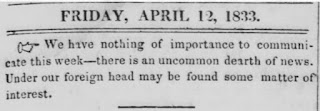Connersville Examiner, Jan.1, 1879
Fairfield Fragments--The Universalists give a concert Friday night, Feb. 1.
-- Several parties here are doing a large business buying and shipping walnut logs.
--The Teachers Institiute, called for Jan 11, was postponed. It was a fizzle.
-- Dances were given last week at several places in the immediate vicinity.
-- John VanMeter recently took unto himself wife No. 3. Well done, & John.
-- The schools in this township will close for the winter term about March 20.
-- Miss Lou Ferguson, a stylish young lady of Indianapolis, recently visited here.
-- Frank Seeley is spending the winter with his uncle, near New Castle.
-- T'is rumored that one of Fairfield's toniest young men and an Ireland belle will wed ere the coming of springtime.
-- That "little charmer" of Glenwood will be sorry to learn that John Conner has been confined to the house for several days with a bad cold.
-- Clinton D. Rose, one of Fairfield's best young men, will leave at an early day for Texas, whither he goes in quest of the fickle goddess, Dame Fortune.
-- Hannibal Hughes of Ripley County, a former Fairfield boy, was recently home on a visit to his parents, who reside near this place.
-- D.F. Ernst, the carriage painter so long connected with the Samuel Rose Carriage manufactory, recently removed to Liberty, where he has opened a paint shop. Fairfield regrets to part with such a good citizen and accomplished workman, but her loss is Liberty's gain.
--While on the way home from Brookville some days since, Charles Filer had a fearful runaway -- his horses becoming frightened at some object along the road, spilled him out of the wagon but luckily, he as well as the team, escaped injury, although the wagon was somewhat badly used up.
-- The Quakertown correspondent for the Liberty Herald says that a drug store saloon is in full blast in Fairfield. How did you get your information, "Zuinglous?"
-- Our merchants are thinking seriously of adopting the cash system. By conducting their business in this way, they will avoid making bad debts and save much care and anxiety. In the long run, it will be much better for the farmer, mechanic and all who have heretofore been customers of the merchant. By the "pay as you go" system, an immense amount of trouble would be prevented. Everybody will be benefitted by the "ready money" plan -- much extravagance would be prevented, more economy practiced, and a safer and better business would be done in Fairfield in the future than for years past.
== Random
--








.jpg)
























